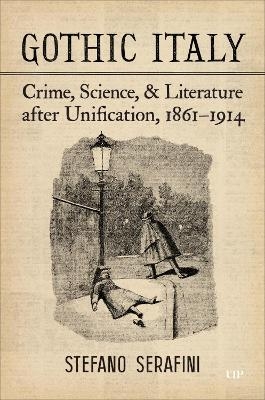
Gothic Italy
Crime, Science, and Literature after Unification, 1861-1914
Seiten
2024
University of Toronto Press (Verlag)
978-1-4875-5863-5 (ISBN)
University of Toronto Press (Verlag)
978-1-4875-5863-5 (ISBN)
Gothic Italy explores how the Gothic permeated and shaped the project of nation-building in the aftermath of Italy’s unification.
The Gothic, proliferating across different literary, socio-cultural, and scientific spaces, permeated and influenced the project of Italian nation-building, casting a dark and pervasive shadow on Italian history. Gothic Italy explores the nuances, contradictions, and implications of the conflict between what the Gothic embodies in post-unification Italy and the values that a supposedly secular, modern country tries to uphold and promote.
The book analyses a variety of literary works concerned with crime that tapped into fears relating to contagion, race, and class fluidity; deviant minds and abnormal sexuality; female transgression; male performativity; and the instability of the new body politic. By tracing how writers, scientists, and thinkers engaged with these issues, Gothic Italy unveils the mutual network of exchanges that informed national discourses about crime. Stefano Serafini brings attention to a historical moment that was crucial to the development of modern attitudes towards normality and deviance, which continue to circulate widely and still resonate disturbingly in contemporary society.
The Gothic, proliferating across different literary, socio-cultural, and scientific spaces, permeated and influenced the project of Italian nation-building, casting a dark and pervasive shadow on Italian history. Gothic Italy explores the nuances, contradictions, and implications of the conflict between what the Gothic embodies in post-unification Italy and the values that a supposedly secular, modern country tries to uphold and promote.
The book analyses a variety of literary works concerned with crime that tapped into fears relating to contagion, race, and class fluidity; deviant minds and abnormal sexuality; female transgression; male performativity; and the instability of the new body politic. By tracing how writers, scientists, and thinkers engaged with these issues, Gothic Italy unveils the mutual network of exchanges that informed national discourses about crime. Stefano Serafini brings attention to a historical moment that was crucial to the development of modern attitudes towards normality and deviance, which continue to circulate widely and still resonate disturbingly in contemporary society.
Stefano Serafini is an EU Marie Skłodowska-Curie Postdoctoral Fellow at Georgetown University and the University of Padua.
Acknowledgments
Introduction
1. Gothic Cities
2. Gothic Minds
3. Gothic Bodies
Conclusion
Notes
Bibliography
Index
| Erscheinungsdatum | 23.02.2024 |
|---|---|
| Reihe/Serie | Toronto Italian Studies |
| Verlagsort | Toronto |
| Sprache | englisch |
| Maße | 152 x 229 mm |
| Gewicht | 1 g |
| Themenwelt | Geisteswissenschaften ► Sprach- / Literaturwissenschaft ► Anglistik / Amerikanistik |
| Geisteswissenschaften ► Sprach- / Literaturwissenschaft ► Literaturgeschichte | |
| Geisteswissenschaften ► Sprach- / Literaturwissenschaft ► Literaturwissenschaft | |
| Recht / Steuern ► Strafrecht ► Kriminologie | |
| Sozialwissenschaften ► Soziologie | |
| ISBN-10 | 1-4875-5863-5 / 1487558635 |
| ISBN-13 | 978-1-4875-5863-5 / 9781487558635 |
| Zustand | Neuware |
| Informationen gemäß Produktsicherheitsverordnung (GPSR) | |
| Haben Sie eine Frage zum Produkt? |
Mehr entdecken
aus dem Bereich
aus dem Bereich
Poetik eines sozialen Urteils
Buch | Hardcover (2023)
De Gruyter (Verlag)
CHF 83,90
Buch | Softcover (2024)
belleville (Verlag)
CHF 27,95


